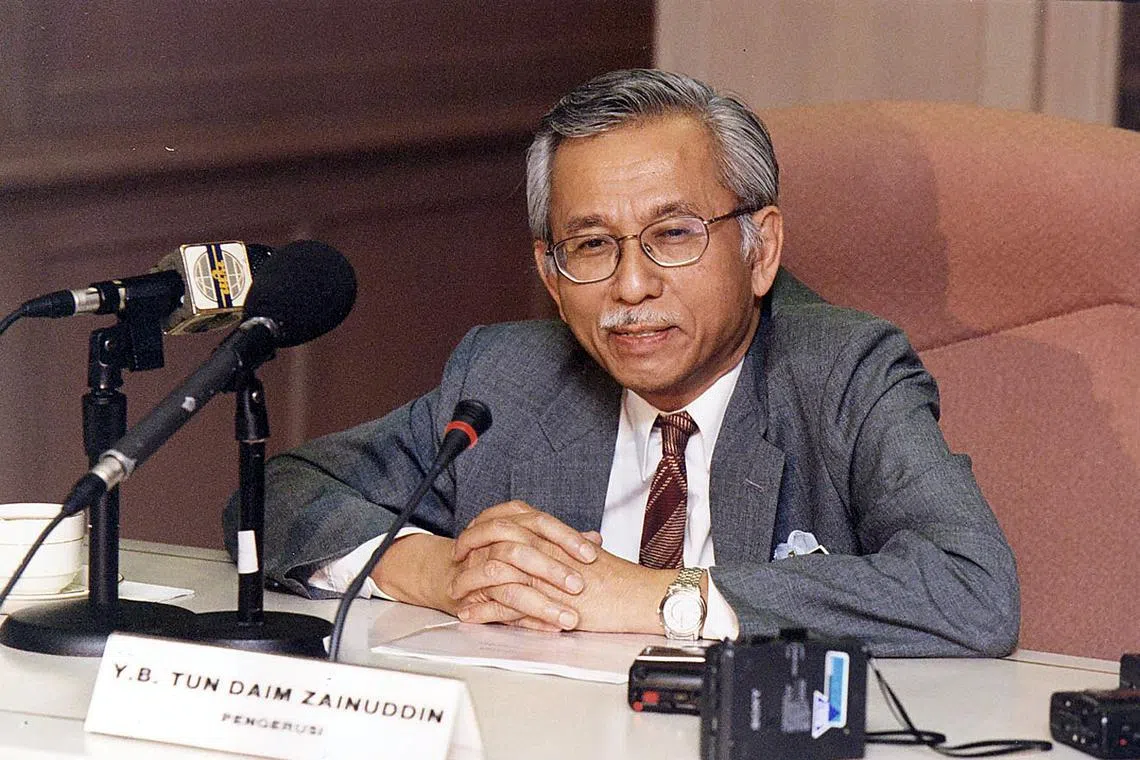Former Malaysian finance minister Daim Zainuddin, key ally of Mahathir, dies at 86
His death comes amid recent allegations of asset non-disclosure

[KUALA LUMPUR] Malaysia’s former finance minister Daim Zainuddin – whose liberalisation policies, banking consolidation, and aggressive privatisation of state-owned companies transformed the nation’s corporate landscape from the 1980s to the early 2000s – passed away on Wednesday (Nov 13) at 86.
His family confirmed in a brief statement that he died at 8.21 am at a hospital in Selangor.
Born on Apr 29, 1938, in Kedah, Daim was a prominent politician and businessman in Malaysia.
He served as finance minister twice – first from 1984 to 1991 during the administration of former prime minister Mahathir Mohamad, where he was instrumental in managing the economy and implementing crucial structural adjustments.
While Daim’s policies helped shape Malaysia’s economic framework, they also sparked controversy and raised concerns about cronyism and allegations of corruption.
He returned for a second term from 1999 to 2001, again under Dr Mahathir’s leadership, to tackle economic challenges following the Asian financial crisis.
Navigate Asia in
a new global order
Get the insights delivered to your inbox.
His death comes amid recent allegations of asset non-disclosure.
Earlier this year, Daim and his wife, Naimah Khalid, faced legal proceedings for allegedly failing to comply with asset declaration requirements set by the Malaysian Anti-Corruption Commission (MACC).
Economic architect
Known for his pragmatic and bold approach, Daim implemented policies that drove rapid industrialisation and attracted foreign investment, helping Malaysia transition from an agrarian to an industrial economy – a cornerstone of Dr Mahathir’s vision.
SEE ALSO
Daim also played a key role in creating a pro-business environment, which attracted multinational companies and fostered growth in key sectors, especially manufacturing.
As finance minister, he steered the economy towards rapid industrialisation and diversification, aligning closely with Dr Mahathir’s goals for national growth and modernisation.
Daim’s investor-friendly policies fostered an environment that attracted foreign investment and boosted manufacturing, especially in electronics, which became one of Malaysia’s key exports.
Additionally, he championed the privatisation of state-owned enterprises, improving efficiency in sectors such as telecommunications and transportation.
Formidable team

Daim and Dr Mahathir were close allies for decades, particularly during the latter’s first term in office from 1981 to 2003, when the former was finance minister.
More recently, Daim was an adviser to Dr Mahathir, especially during the latter’s brief return to office from 2018 to 2020.
Together, they were seen as a formidable team in shaping Malaysia’s economic direction, and Daim often acted as a behind-the-scenes strategist for Dr Mahathir’s administration.
In a social media post on Wednesday, Dr Mahathir expressed sadness over Daim’s passing, stating that he has lost a comrade who stood by him in the fight for the country.
“He should be honoured for his contributions to the country. However, in the final years of his life, he faced unjust criticism, largely driven by vengeance,” he said.
Prime Minister Anwar Ibrahim offered his condolences on the death, said government spokesperson Fahmi Fadzil.
Former prime minister Muhyiddin Yassin wrote: “His service to the country in managing the economy and steering Malaysia out of the Asian financial crisis should be remembered in the annals of history.”
Influential businessman

During his career, Daim was known for his business deals in Malaysia and abroad.
After facing initial setbacks in the salt and plastics industries, he became an influential figure in the real estate sector after he founded Syarikat Maluri.
He later expanded into banking by acquiring the Indo-Suez Bank, which he rebranded as the Malaysian-French Bank.
Langkah Bahagia, an investment vehicle linked to Daim, held substantial stakes in financial institutions, notably a 29 per cent share in Alliance Financial Group (AFG). Langkah Bahagia was an example of how Daim’s political and business interests intertwined, especially within Malaysia’s banking sector.
Beyond this, his financial reach extended across various sectors, with banks under his International Commercial Banks group operating throughout Asia and Africa.
Causeway connection
The stake held by Langkah Bahagia in AFG underwent significant changes over the years.
Langkah Bahagia held a major stake in AFG through its 51 per cent ownership of Vertical Theme, which owned 29 per cent of AFG.
Singapore investment company Temasek owned the remaining 49 per cent of Vertical Theme. More than 10 years ago, DBS (in which Temasek holds a substantial stake) moved to acquire a stake in AFG from Temasek but a deal did not materialise.
In April 2016, control of Langkah Bahagia, including its stake in AFG, was sold to investors led by Singapore hotelier Ong Beng Seng, signalling a shift away from Daim’s influence in the banking sector.
Another notable acquisition by Daim’s private vehicle included a stake in Affin Bank during a broader reorganisation of Malaysia’s banking assets while Daim served as finance minister.
Ong Kian Ming, pro vice-chancellor of external engagement at Taylor’s University, noted that Daim played a pivotal role in the “Malaysia Incorporate” project, which aimed to align government and private sector interests to boost the country’s economic development in the 1980s and 1990s.
Daim’s involvement in the political and corporate nexus in Malaysia, however, also sparked controversy, facilitating crony capitalism and proxy political holdings in privatised corporations.
While Daim could have left a more positive legacy through institutional reforms as Mahathir’s adviser, he focused more on corporate interests and rivalries, Ong added.
“Ultimately, he is remembered as a clever, quiet figure who benefited from the system but did not necessarily improve the overall structure of the Malaysian economy,” he told The Business Times.
MACC probe
Daim came under investigation by the MACC due to financial activities disclosed in the Pandora Papers, which implicated him and his family in extensive offshore holdings.
The MACC probe sought to uncover whether his reported US$31 million in offshore assets and other properties were acquired through corruption or other illicit means.
Specifically, Daim’s family-controlled ZA Star Trust, registered in the Cayman Islands, has come under scrutiny for substantial investments in high-value properties in the UK and US.
Documents obtained by the International Consortium of Investigative Journalists indicated that Daim’s sons, Muhammad Amin and Muhammad Amir, along with his wife, are beneficiaries of a trust holding assets valued at US$52.5 million.
Investigators have also frozen bank accounts and seized assets, including a 60-storey skyscraper in Kuala Lumpur, as part of this ongoing case.
Daim and his family maintained that their wealth was legitimately acquired through prior business ventures and estate planning.
However, his wife and children have also faced questioning, with Naimah being formally charged with failing to declare assets. Daim had challenged the legality of the probe, arguing it was politically motivated.
While specific assets in Singapore remain largely confidential, the probe has expanded into his regional business dealings, including involvement with a Malaysian stock-trading platform previously hosted in Singapore, known as Clob, which closed in 1998.
In a report by Edge Malaysia on Wednesday, Attorney-General Mohd Dusuki Mokhtar said he will review the ongoing prosecution of Daim following his passing.
Decoding Asia newsletter: your guide to navigating Asia in a new global order. Sign up here to get Decoding Asia newsletter. Delivered to your inbox. Free.
Share with us your feedback on BT's products and services







